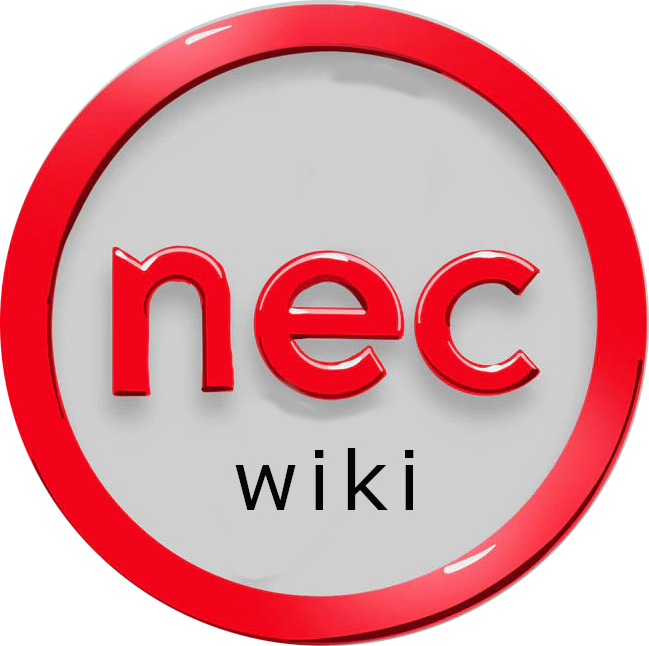Article 348
Flexible Metal Conduit: Type FMC
Part I. General
348.1 Scope. This article covers the use, installation, and construction specifications for flexible metal conduit (FMC) and associated fittings.
Part II. Installation
348.10 Uses Permitted. FMC shall be permitted to be used in exposed and concealed locations.
348.12 Uses Not Permitted. FMC shall not be used in the following:
- In wet locations
- In hoistways, other than as permitted in 620.21(A)(1)
- In storage battery rooms
- In any hazardous (classified) location except as permitted by other articles in this Code
- Where exposed to materials having a deteriorating effect on the installed conductors, such as oil or gasoline
- Underground or embedded in poured concrete or aggre‐ gate
- Where subject to physical damage
348.20 Size.
- Minimum. FMC less than metric designator 16 (trade size 1∕2) shall not be used unless permitted in 348.20(A)(1) through (A)(5) for metric designator 12 (trade size 3∕8).
- For enclosing the leads of motors as permitted in 430.245(B)
- In lengths not in excess of 1.8 m (6 ft) for any of the following uses:
- For utilization equipment
- As part of a listed assembly
- For tap connections to luminaires as permitted in 410.117(C)
- For manufactured wiring systems as permitted in 604.100(A)
- In hoistways as permitted in 620.21(A)(1)
- As part of a listed assembly to connect wired luminaire sections as permitted in 410.137(C)
- Maximum. FMC larger than metric designator 103 (trade size 4) shall not be used.
Informational Note: See 300.1(C) for the metric designators and trade sizes. These are for identification purposes only and do not relate to actual dimensions.
348.22 Number of Conductors. The number of conductors shall not exceed that permitted by the percentage fill specified in Table 1, Chapter 9, or as permitted in Table 348.22, or for metric designator 12 (trade size 3∕8).
Cables shall be permitted to be installed where such use is not prohibited by the respective cable articles. The number of cables shall not exceed the allowable percentage fill specified in Table 1, Chapter 9.
348.24 Bends — How Made. Bends in conduit shall be made so that the conduit is not damaged and the internal diameter of the conduit is not effectively reduced. Bends shall be permit‐ ted to be made manually without auxiliary equipment. The
348.26 ARTICLE 350 — LIQUIDTIGHT FLEXIBLE METAL CONDUIT: TYPE LFMC
Table 348.22 Maximum Number of Insulated Conductors in Metric Designator 12 (Trade Size 3∕8) Flexible Metal Conduit (FMC)*

Types RFH-2, SF-2 Types TF, XHHW, TW
Types TFN, THHN,
THWN Types FEP, FEBP, PF, PGF
Size (AWG) | Fittings Inside Conduit | Fittings Outside Conduit | Fittings Inside Conduit | Fittings Outside Conduit | Fittings Inside Conduit | Fittings Outside Conduit | Fittings Inside Conduit | Fittings Outside Conduit | |||
| 18 | 2 | 3 | 3 | 5 | 5 | 8 | 5 | 8 | |||
| 16 | 1 | 2 | 3 | 4 | 4 | 6 | 4 | 6 | |||
| 14 | 1 | 2 | 2 | 3 | 3 | 4 | 3 | 4 | |||
| 12 | — | — | 1 | 2 | 2 | 3 | 2 | 3 | |||
| 10 | — | — | 1 | 1 | 1 | 1 | 1 | 2 |
*In addition, one insulated, covered, or bare equipment grounding conductor of the same size shall be permitted.
radius of the curve to the centerline of any bend shall not be less than shown in Table 2, Chapter 9 using the column “Other Bends.”
348.26 Bends — Number in One Run. There shall not be more than the equivalent of four quarter bends (360 degrees total) between pull points, for example, conduit bodies and boxes.
348.28 Trimming. All cut ends shall be trimmed or otherwise finished to remove rough edges, except where fittings that thread into the convolutions are used.
348.30 Securing and Supporting. FMC shall be securely fastened in place and supported in accordance with 348.30(A) and (B).
- Securely Fastened. FMC shall be securely fastened in place by an approved means within 300 mm (12 in.) of each box, cabinet, conduit body, or other conduit termination and shall be supported and secured at intervals not to exceed 1.4 m (41∕2 ft). Where used, cable ties shall be listed and be identified for securement and support.Exception No. 1: Where FMC is fished between access points through concealed spaces in finished buildings or structures and supporting is impracticable.Exception No. 2: Where flexibility is necessary after installation, lengths from the last point where the raceway is securely fastened shall not exceed the following:
- 900 mm (3 ft) for metric designators 16 through 35 (trade sizes1∕2 through 11∕4)
- 1200 mm (4 ft) for metric designators 41 through 53 (trade sizes 11∕2 through 2)
- 1500 mm (5 ft) for metric designators 63 (trade size 21∕2) and larger
- Supports. Horizontal runs of FMC supported by openings through framing members at intervals not greater than 1.4 m (41∕2 ft) and securely fastened within 300 mm (12 in.) of termi‐ nation points shall be permitted.
348.42 Couplings and Connectors. Angle connectors shall not be concealed.
348.56 Splices and Taps. Splices and taps shall be made in accordance with 300.15.
348.60 Grounding and Bonding. If used to connect equip‐ ment where flexibility is necessary to minimize the transmission of vibration from equipment or to provide flexibility for equip‐ ment that requires movement after installation, an equipment grounding conductor shall be installed.
Where flexibility is not required after installation, FMC shall be permitted to be used as an equipment grounding conductor when installed in accordance with 250.118(5).
Where required or installed, equipment grounding conduc‐ tors shall be installed in accordance with 250.134(B).
Where required or installed, equipment bonding jumpers shall be installed in accordance with 250.102.
